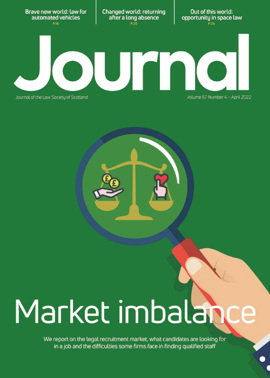President
There has been much written about the goods and the ills of mobile communication and social media. As a criminal defence solicitor I have seen phone and text logs work wonders for both the Crown and the defence. I have also lost count of the number of cases resulting from the threats or abuse, violence or the destruction of property (alleged!) which started when one party to an intimate relationship interrogated the mobile phone of the other party. The pattern often involves a phone being snatched, a struggle to access the correct app and a further struggle by the phone’s owner to provide an innocent explanation for what is found.
So what was I to think when my wife, who has her own phone which she had been using, recently asked me to give her my phone – and to unlock it? With a clear conscience, of course, I complied. But I was curious. The answer was simple: Wordle. Or rather cheating at Wordle by using a second device after her fifth unsuccessful guess.
For the uninitiated, Wordle is an addictive online sensation which has the user trying to guess a new five letter word every day. You are given clues following failed attempts, not unlike the old game of battleships that some may remember, but only have six attempts before the site laughs at you and points out what should have been obvious. (Though in my opinion “nymph”, “caulk” and “knoll” are not the most obvious hits after their respective misses.)
As we move through life, it is good to be informed and to inform ourselves from our hits and our misses. Learning from our mistakes and doing better next time is surely axiomatic. It may even take more than five misses to get a hit. It is important though that we are working from a firm base, that we are well informed and that we identify what is and what is not “fake news”.
Reliable source
It is interesting that one of the Scottish Government’s current public information campaigns tells us of the need to be careful before believing all that we are told. Just as we need to identify that which is to be ignored, the corollary is surely to recognise and act on that which is reliable.
In a recent meeting with the Lord President, I was able to introduce him to our new CEO Diane McGiffen. After I had observed the benefit of Diane’s fresh perspectives from her background at Audit Scotland, Diane spoke eloquently of how her initial impressions of the Law Society of Scotland being central to Scottish civic society had only been reinforced by her early experiences in post.
She had seen at first hand the Society’s contributions to the debates on equality and diversity, legal services regulation and criminal justice review, as well as broad engagement on anti-money laundering, a UK Bill of Rights and, further afield, support for Ukraine. Why was it, she wondered, that on the apparently straightforward question of legal aid funding we were not being listened to? And, from my perspective, the Scottish Government has had more than six chances to get that right. How many more will it take? What damage will be done before it does?
Perspectives
Features
Briefings
- Criminal court: Thom bar still applies
- Licensing: tighter rules for the pet trade
- Insolvency: Transition from the COVID measures
- Tax: What did the Spring Statement bring?
- Immigration: Providing a home for Ukrainians
- Scottish Solicitors' Discipline Tribunal
- Property: RCI – what does it involve?
- In-house: Looking for a star







